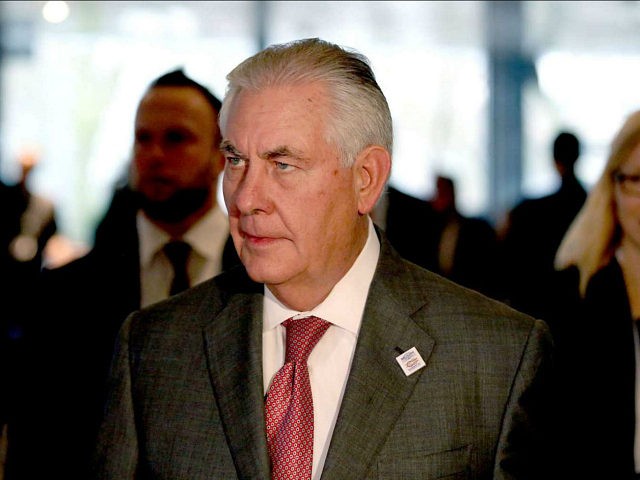At a meeting with NATO ministers in Brussels, U.S. Secretary of State Rex Tillerson declared that “American and NATO support for Ukraine remains steadfast,” and the allies “stand firm in support of Ukraine’s sovereignty and territorial integrity.”
“We do not, and will not, accept Russian efforts to change the borders of territory of Ukraine,” Rex Tillerson declared.
He also stated that American sanctions on Russia will remain “until Moscow reverses the actions that triggered our sanctions.”
CNN notes that President Trump was supposedly considering a relaxation of Ukraine sanctions, in the pursuit of improved relations with Moscow. However, Tillerson himself has always said Russia’s claim on the territory it annexed in Crimea was”illegitimate.”
Tillerson directly referred to Russia’s “Minsk commitments,” the protocol laboriously negotiated in 2014 and 2015 that was supposed to end Russia’s interference in Ukraine. Russian Foreign Minister Sergey Lavrov this week accused the Ukrainians of wanting the Minsk agreement “dead in a way which would allow them to blame Russia and the people in the east of Ukraine.”
This was a reference to the insurgents in eastern Ukraine supported by Moscow. In essence, Lavrov accused Ukrainian President Pyotr Poroshenko of being captive to “radicals” in his own country, who want him to abandon or undermine the compromise reached in Minsk.
NATO, conversely, sees the Minsk accords as a somewhat lopsided deal favoring Russia and the separatists, pushed on the Ukrainians with Russian military muscle – and yet Russia and its separatist allies still fail to comply with its clearest provisions. The disposition of Crimea is still portrayed as an ultimate deal-breaker by both sides.
Politico reports that Tillerson will not meet with Russia’s ambassador to NATO, Alexander Grushko. Grushko told a NATO-Russia Council meeting on Thursday that NATO’s increased strength on the eastern borders of Russia “weakens regional stability, and does not correspond to real security needs.”
Tillerson’s trip to Brussels also included a discussion of the financial contributions made by member states. He told the allies that the United States spends a “disproportionate share” on defense and asked the ministers to prepare plans for reaching budgetary targets within two months.
“Our goal should be to agree at the May leaders meeting that by the end of the year all allies will have either met the pledge guidelines or will have developed plans that clearly articulate how, with annual milestone progress commitments, the pledge will be fulfilled,” he said.
“As President Trump has made clear, it is no longer sustainable for the U.S. to maintain a disproportionate share of NATO’s defense expenditures,” Tillerson declared. “Allies must increase defense spending to meet their commitments. Allies that do not have a concrete plan to spend 2 percent of GDP on defense by 2024 need to establish one now.”
CBS News followed up with NATO Secretary-General Jens Stoltenberg after the meeting. Stoltenberg said all of the organization’s members “agree that we have to implement the decision… and this is not only in words but also in deeds.”
“Allies have started to increase defense spending in one year, 10 billion in 2016. That is a significant step in the right direction,” he said. “We are working on the plans. It is too early to say how they will be designed and we haven’t made any final decisions on them.”
However, CBS notes that some countries would have to dramatically increase their military spending – by up to 100 percent – in order to meet these budget targets. Germany’s Foreign Minister flatly stated it would be politically impossible for Berlin to double its spending as required.
Tillerson stressed continuing American support for NATO under the new administration. “We understand that a threat against one of us is a threat against all of us, and we will respond accordingly. We will uphold the agreements we have made to defend our allies,” he said.

COMMENTS
Please let us know if you're having issues with commenting.